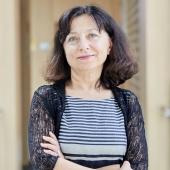
Algae in Europe – an Ocean of Opportunities
Algae in Europe – an Ocean of Opportunities
Charlina Vitcheva, Director-General, DG MARE, Belgium

Algae in Europe – an Ocean of Opportunities
Charlina Vitcheva, Director-General, DG MARE, Belgium
About the speaker:
Mrs Charlina Vitcheva was appointed Director General of DG MARE, Maritime Affairs and Fisheries in June 2020.
Prior to this, she became Deputy Director General of the Joint Research Center (JRC) in September 2016. She was acting DG for the JRC from the 1st November 2019 to the 30th April 2020.
Previously, Mrs Vitcheva has been Director of Smart & Sustainable Growth in Southern Europe at DG Regional and Urban Policy (DG REGIO), and also held a Director’s position on Inclusive Growth, Territorial and Urban Development and Northern Europe.
Before joining the European Commission, Charlina Vitcheva has been active in the Bulgarian public administration for 15 years, including at the Permanent Representation in Brussels, being actively involved in the negotiations of Bulgaria accession to the European Union, notably in charge of agricultural and fisheries dossiers and heading the negotiations, from 2000 to 2004, in the area of agriculture and rural development, food safety and fisheries.
Organization info:
The European Commission’s Directorate General for Maritime Affairs and Fisheries (DG MARE) aims to develop the potential of the European maritime economy and to secure sustainable fisheries and aquaculture, a stable supply of seafood, healthy seas and prosperous coastal communities – for today's Europeans and for future generations. We develop and implement the Common Fisheries Policy and promote an integrated approach to all maritime policies, in full alignment with and direct support to the European Green Deal.
Interview:
1) What is your vision on the European seaweed industry?
Looking at the bigger picture, in order to achieve climate neutrality by 2050 – the key objective of the European Green Deal – EU countries will have to drastically reduce their greenhouse gas emissions and find ways to compensate for the remaining and unavoidable emissions. My vision is that seaweed sector becomes one of the key sectors in the EU that will contribute to remove excess carbon and nutrients while scaling up its business case. For this to happen, my vision would be that by 2050, plant aquaculture will be considered as “normal” in Europe as fish or shellfish aquaculture today.
2) How will the EU stimulate the development of the European seaweed industry in the coming years?
Well, we outlined our plans in the EU Algae Initiative, adopted by the European Commission one and a half years ago. It came with an action plan of 23 actions, which we are currently implementing at full speed.
To stimulate the development of the seaweed industry in the EU, we will continue this implementation. We will make sure our EU4Algae platform (accounting some 900 registered members) grows and continues to operate for the benefit of entire EU algae sector. We will work with national authorities to increase their support to algae sector developments – in the end it is at national level that decisions about licenses are taken.
At European level, we will raise awareness and acceptance of algae in the EU, as we started doing with the first ever EU Algae Awareness Summit last year in Paris. This comes with continued efforts to increase ocean literacy and awareness, as well as the profile of algae in current and future EU policy initiatives. We will promote diversification of local fishers and blue economy actors’ activities towards regenerative ocean farming - three EU-funded projects were already launched in the North and Baltic Sea in 2023!
3) What is your favorite seaweed dish?
I like the broad variety of foods (or drinks) that you can prepare with seaweed, be it sushi, wakame chips, algae tartare or a spirulina drink. And it’s my favourite when it’s farmed in the EU!